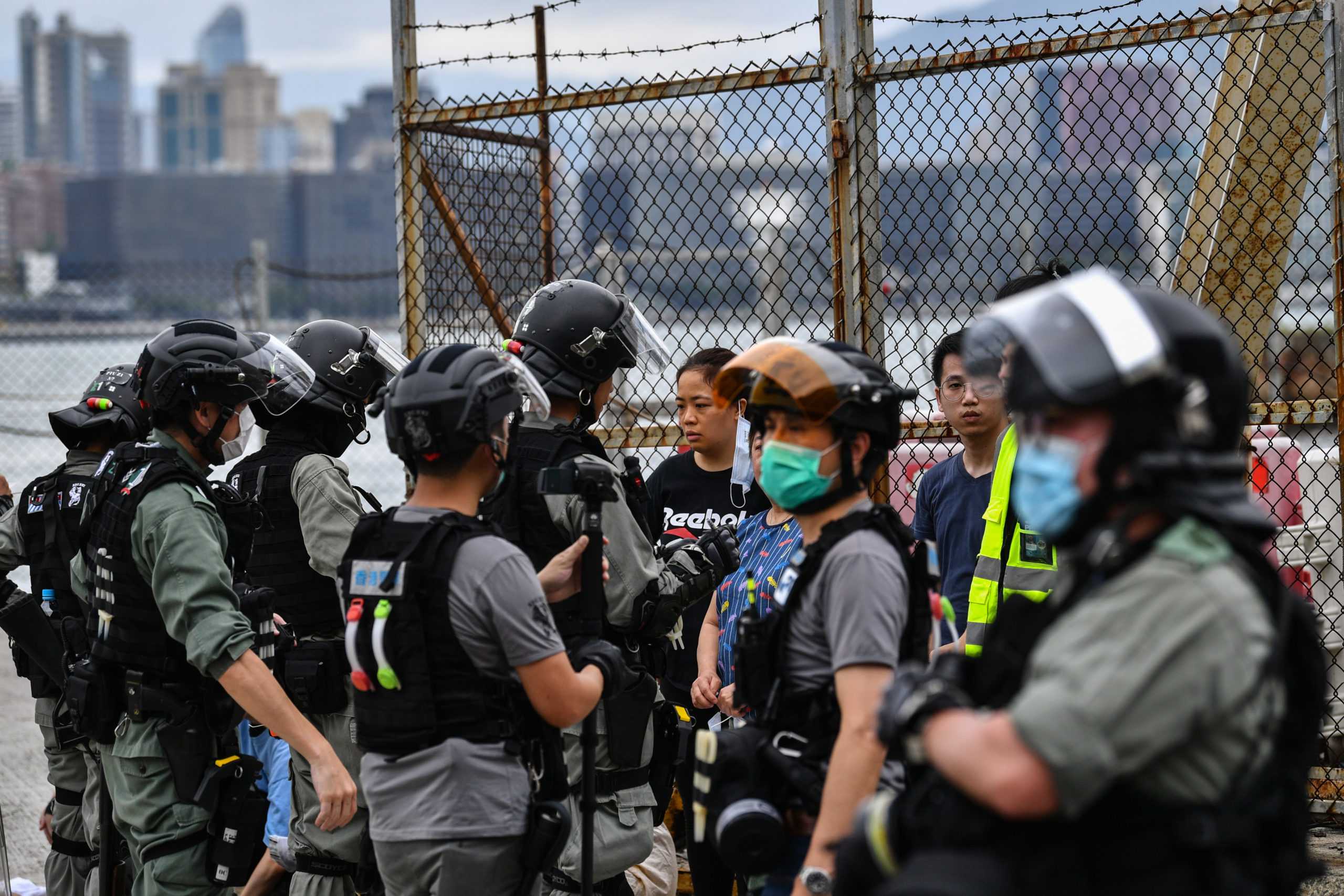
Riot police detain people as they disperse protesters taking part in a pro-democracy rally against a proposed new security law in Hong Kong on May 24, 2020. – The proposed legislation is expected to ban treason, subversion and sedition, and follows repeated warnings from Beijing that it will no longer tolerate dissent in Hong Kong, which was shaken by months of massive, sometimes violent anti-government protests last year. (Photo by Anthony WALLACE / AFP)
HONG KONG — Police fired tear gas and pepper spray at hundreds of Hong Kong pro-democracy protesters who gathered Sunday in opposition to a controversial security law proposed by China last week.
The proposal is expected to ban treason, subversion, and sedition, and comes after Hong Kong was shaken by months of massive, sometimes violent anti-government protests, and repeated warnings from Beijing that it would not tolerate dissent.
Fearing the proposed law will spell the end of the city’s treasured freedoms, campaigners called for supporters to rally and hundreds responded, gathering in the busy Causeway Bay and Wan Chai districts, chanting slogans against the government as riot police warned them against the assembly.
“People may be criminalized only for words they say or publish opposing the government,” 25-year-old protester Vincent told AFP.
“I think Hongkongers are very frustrated because we didn’t expect this to come so fast and so rough. But… we won’t be as naive as to believe that Beijing will simply sit back and do nothing. Things will only get worse here.”
Riot police were deployed after earlier warnings from authorities against unauthorized assembly and the city’s current coronavirus-linked law banning public gatherings of more than eight people.
The Sunday protest followed a similar pattern to many of last year’s demonstrations, with police firing tear gas and pepper spray, and protesters pushing back — some throwing objects such as umbrellas at the police.
The Hong Kong pro-democracy movement had previously fizzled as arrests mounted and, later, large gatherings were banned to stop the coronavirus.
More than 8,300 people have been arrested since the protests erupted last year. Around 200 were detained during small rallies at malls on Mother’s Day earlier this month.
Police had warned that they would “make arrests as appropriate”, and at least one pro-democracy campaigner was detained by police on Sunday at the start of the rally, AFP reporters said.
Hong Kong residents enjoy rights — including freedom of speech — unseen on the mainland as part of the agreement that saw the British colony handed back to China in 1997, and the city has its own legal system and trade status.
Fears had been growing for years that Beijing was chipping away at those freedoms and tightening its control on the city, and campaigners have described the new proposal as the most brazen move yet.
Of particular concern is a provision allowing Chinese security agents to operate in Hong Kong, and that they could launch a crackdown against those dissenting against the mainland’s Communist rulers.
“I’m very scared, but I still have to come out,” said protester Christy Chan, 23.
“Aside from being peaceful, rational, and non-violent, I don’t see many ways to send out our messages.”
‘Disastrous proposal’
A top pro-Beijing official, however, claimed on Saturday that mainland law enforcement would not operate in Hong Kong without “approval” from local authorities.
“I’m not worried about anybody being arrested by a police officer from the mainland and then taken back to China for investigation or punishment,” Maria Tam, a Hong Kong law advisor to the Chinese parliament, told AFP.
“It is not, not, not going to happen.”
Hong Kong’s unpopular pro-Beijing leader Carrie Lam has defended the new proposal, saying it was necessary to protect national security and punish “violent political elements”.
But there is a deep mistrust of China’s opaque legal system in Hong Kong and of how Beijing might use such regulations in the city — the massive protests last year were sparked by a now-scrapped bill that would have allowed extraditions to the mainland.
The new proposal could prove even more wide-ranging than that plan, and several Western governments have voiced alarm.
China’s legislature is expected to rubber-stamp the draft resolution on Thursday, the last day of the annual parliamentary gathering before the details are fleshed out at another meeting at a later date.
Officials have said the law would then be implemented locally.


